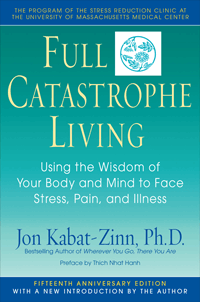Jon Kabat-Zinn, author of The Full Catastrophe: Using the Wisdom of Your Body and Mind to Face Stress, Pain, and Illness, is the founding director of the Stress Reduction Clinic and the Center for Mindfulness in Medicine, Health Care, and Society at the University of Massachusetts Medical School. I first encountered him during a Mindfulness-Based Stress Reduction Class. The class was designed around Kabat-Zinn’s teachings and philosophy. The class involves meditation exercises (particularly mindfulness meditations), poem readings, group discussions, hatha yoga, and something called a Body Scan
Mindfulness-based Stress Reduction skills taught me better ways to accept and deal with the chronic pain caused by my spinal injury.
I’ll be addressing the other elements in future posts, but would like to focus on the book here. Rather than doing an extensive book review and lecturing you into a coma, I’m listing some key lessons and associated quotes. This is a dense book, and I strongly recommend you take the time to read it as my summary cannot begin to touch the wisdom within.
So, peruse the list below. Some will speak to you, and some may not.
Patience:
“Patience is a form of wisdom. It demonstrates that we understand and accept the fact that sometimes things must unfold in their own time. A child may try to help a butterfly to emerge by breaking open its chrysalis. Usually the butterfly doesn’t benefit from this. Any adult knows that the butterfly can only emerge in its own time, that the process cannot be hurried.”
Intuition:
“It is far better to trust in your intuition and your own authority, even if you make some ‘mistakes’ along the way, than always to look outside of yourself for guidance. If at any time something doesn’t feel right to you, why not honor your feelings? Why should you discount them or write the off as invalid because some authority or some group of people think or say differently? This attitude of trusting yourself and your own basic wisdom and goodness is very important in all aspect of the meditation practice.”
Finite Energy:
“…in the course of our daily lives we often waste a lot of energy denying and resisting what is already fact. When we do that, we are basically trying to force situations to be the way we would like them to be, which only makes for more tension. This actually prevents positive change from occurring. We may be so busy denying and forcing and struggling that we have little energy left for healing and growing, and what little we have may be dissipated by our lack of awareness and intentionality.”
Mindfulness / Being in the Moment:
“For one thing we tend to have little awareness of the incessant and relentless activity of our own mind and how much we are driven by it. That is not too surprising, given that we hardly ever stop and observe the mind directly to see what it is up to. We seldom look dispassionately at the reactions and habits of our own mind, at its fears and its desires.”
You are not your thoughts:
“…namely the realization that they are not their thoughts. This discovery means that they can consciously choose to relate or not to relate to their thoughts in a variety of ways that were not available to them when they were unaware of this simple fact.”
Impermanence:
“Note than an individual thought does not last long. It is impermanent. If it comes, it will go. Be aware of this.”
Beginner’s Mind (this is the Buddhist term for this idea; as a person who subscribes to many Buddhist teachings, I can’t think of a better way to frame it):
“There are many different ways of looking at any thing or event or process. A dog is just a dog. In one way there is nothing special about it; at the same time it is extraordinary, even miraculous. It all depends on how you are looking at it. We might say that it is both ordinary and extraordinary. The dog doesn’t change when you change the way you look. It is always just what it is. That is why dogs and flowers and mountain and the sea are such great teachers. They reflect your own mind. It is your mind that changes.”
Complementarity:
“The notion of complementarity remind us that all system of knowledge may be incomplete and need to be seen as aspects of larger whole that lies beyond all the models and theories that attempt to describe it.”
Self-Efficacy / Confidence:
“Self-efficacy is a belief in your ability to exercise control over specific events in your life. It reflects confidence in your ability to actually do things, a belief in your ability to make things happen, even when you might have to face new, unpredictable, and stressful occurrences. Dr. Albert Bandura and his colleagues at Stanford University Medical School have shown that a strong sense of self-efficacy is the best and most consistent predictor of positive health outcomes in many different medical situations.”
Acceptance:
“The example of gravity reminds us that, in and of itself, stress is neither good nor bad, it’s just the way things are.”
Empowerment through Mindfulness:
“…it stands to reason that by becoming conscious of our options in stressful situations and by being mindful of the relevance and effectiveness of our responses in those situations, we may be able to exert considerable control over our experience of the stress and thereby influence whether or not it will lead to disease.”
Stress:
“When you internalize the stress reaction, you don’t get the resolution that fighting or running brings. You don’t peak, and you don’t get the physical release and recovery afterward. Instead, you just carry the arousal around inside you, both in the form of stress hormones, which are playing havoc with your body, and in the form of your agitated thoughts and feelings.”
“You can actually allow yourself to feel threatened or fearful or angry or hurt and to feel the tension in you body in the moments. Being conscious in the present, you can easily recognize these agitations for what they are, namely thoughts an feelings and sensations. This simple momentary shift from mindless reaction to mindful recognition can reduce the power of the stress reaction and its hold over you.”
Wise Attention:
“Instead of discussing symptoms as woes and how to get rid of them, when we do focus on symptoms of one kind or another it is to tune in to the actual experience of the symptoms themselves in those moments when they dominate the mind and body. We do this in a particular way, which might be called giving them wise attention.”
Attachment (another Buddhist concept; in fact, these all are):
“To break out of this trap of always being driven by our own desires, it is not a bad exercise to ask yourself from time to time, ‘What is my own way?’ ‘What do I really want?’ ‘Would I know it if I got it?’ “Does everything have to be ‘perfect’ right now, or under my total control right now, for me to be happy?’





What do you think?